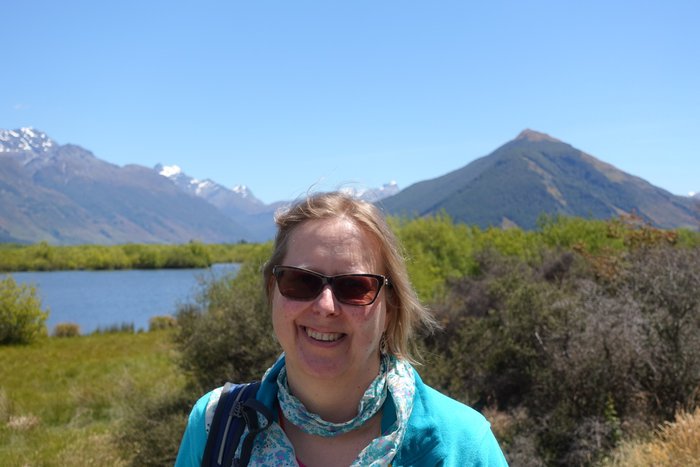Why taking away that worry of the cancer returning would be life changing…
We’ve recently funded 16 new research projects, but we couldn’t fund research without you, our community who so generously donate to blood cancer research. In this blog we hear from Carole who talks about what this latest research means to her.
My name is Carole, and in 2020 I was diagnosed with a type of blood cancer called lymphoplasmacytic lymphoma (LPL), which is a slow growing type of non-Hodgkin lymphoma.
Challenges of treatment during the pandemic
My diagnosis and treatment all happened during the height of the Covid pandemic when most people were staying indoors and loved ones weren’t allowed to attend hospital appointments. This created a number of challenges and made things even more unnerving.
I have had chronic kidney disease for many years, and because of complications ended up in hospital. It turned out that I needed two of my parathyroid glands removed. They were causing high calcium, but the high calcium levels persisted and blood tests, a kidney biopsy, a bone marrow biopsy and a PET CT scan then confirmed I also had stage 4 non-Hodgkin lymphoma in my kidneys, thyroid, parathyroids and bone marrow.
It was really hard hearing this news and trying to understand what this diagnosis meant"
I remember having so many questions. What did slow growing cancer even mean? What does stage 4 mean? I didn’t know anyone who had lymphoma or any other type of blood cancer.
I had to get up to speed quickly
I learned that being told you have stage 4 lymphoma is totally different to stage 4 in other cancers, and that my lymphoma was “treatable but not curable”.
My haemato-oncologist and renal consultants were really great at discussing the best overall approach with me. I liked the fact they were straight with me on everything. They told me that due to my lymphoma diagnosis I would never now be eligible for a kidney transplant as the immunosuppressant drugs that you have to take after a transplant make it more likely your lymphoma will come back or a different type of lymphoma will appear. So kidney dialysis would be my only option as my kidneys deteriorate further in coming years.
Learning this on top of the lymphoma diagnosis felt like a double blow, but like others with blood cancer, we often have multiple conditions we have to learn to juggle alongside each other."
Treatment for my lymphoma needed to start immediately which was also scary but in a strange way it helped. Within 10 days of my diagnosis, I began six months of chemotherapy and immunotherapy and have been in remission since then.
Knowing your cancer might come back
Fortunately for me, my type of blood cancer can be managed with treatment but at the moment there isn’t a cure so it’s something I have had to live with. It can be tough knowing that your cancer might come back and that this might mean you have to go through treatment again when it resurfaces.
I try to put the fear that the disease will come back at the back of my mind and get on with enjoying my life as best I can."
I think people underestimate the mental challenges of living with blood cancer as a long-term condition. I have regular blood tests and every time I wait for results, the fear of relapse comes to the front of my mind.
Any minor ache, pain, lump or infection immediately jolts me into thinking “is it back?” The phrase “no news is good news” is definitely true for me and others like me in remission.
The importance of research
I’ve been a patient voice representative at Blood Cancer UK for the past two years. I’ve had the privilege of being involved in reviewing some of the research applications alongside scientific experts. This means I know first-hand that any donation, however big or small, is always spent really thoughtfully.
Research helps to develop better treatments so that people affected by blood cancer get the chance of normal life expectancy."
I am really excited by Dr Riches’ research project. He is working on a new combination of drugs to create a new, more effective treatment for people with follicular lymphoma that gets rid of all the cancer cells so that the disease cannot come back as like my blood cancer, follicular lymphoma can come back after initial treatment, putting a huge mental strain on people affected by the disease.
This research could be a real gamechanger for people with the disease and people with other forms of lymphoma. While I don’t personally have follicular lymphoma, the type of lymphoma I have shares lots of similarities, so any discovery is important for my type of lymphoma too. This research could give new and expanded options allowing people with the disease a much longer period in remission.
Taking away that worry of the cancer returning would be life changing."
While treatments to keep follicular lymphoma and my type of lymphoma at bay are vital, the cure or prevention of blood cancers is the ultimate wish for each of us.
Blood cancer is the 5th most common cancer in the UK. The only way to beat it is to fully understand the causes of blood cancer from a science perspective. This is why research projects funded by Blood Cancer UK are so important.
Thank you to Carole for so eloquently sharing her story.
Stay in touch
Sign up to our e-newsletter to hear all the latest from Blood Cancer UK
We will keep you updated about our work and the ways you can help, including campaigns and events. We promise to respect your privacy and we will never sell or swap your details.

